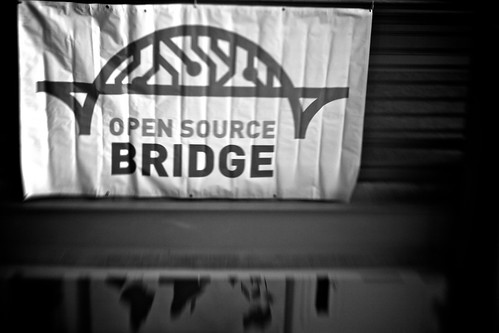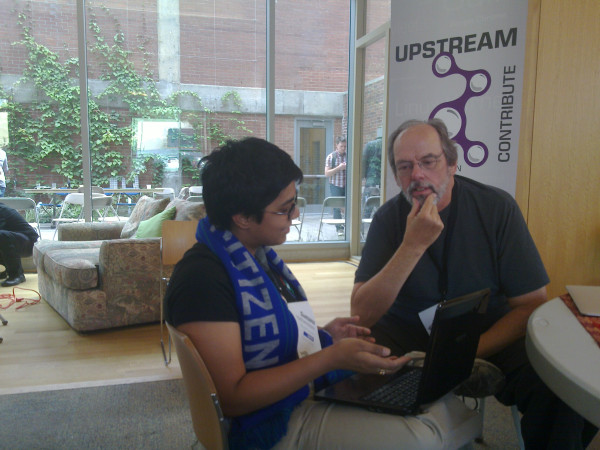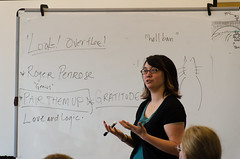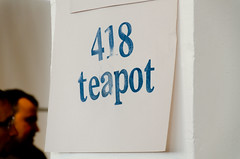# (5) 03 Jun 2011, 10:22AM: Checksumana:
How do you remember that you have already locked the door?
Whether I'm leaving the house or going to sleep, I usually have the urge to double-check that the door is locked. Then I check it once and am satisfied. In a vanishingly small percentage of cases, I haven't locked it. If you're in the same situation: what do you do to firmly recollect when you have locked it and reassure yourself that you don't need to check it again?
In cases where I've had three locks on the door (say, knob, deadbolt, and chain), I've gotten some mileage out of audibly chanting "Batman, Spiderman, Superman" as I lock the locks, working my way from bottom to top. Then I can recall saying it, because I remember things I've said better than I remember instances of habitual actions with my hands.
Just today I came up with this idea: if multiple people are leaving the house together, they can lock the door simultaneously, like missile silo workers turning keys to launch weapons. That, too, might be more memorable.
What do you do?
# 05 Jun 2011, 10:39AM: Histories:
When I was getting my bachelor's degree at the University of California at Berkeley, I took a few courses studying technology in the context of history and political science. The other day I discovered that I still owned a thick "reader" for one of those courses, photocopies of a bunch of articles and book chapters, and settled down to skim through the thing. Sitting on the living room floor with the couch at my back, reading a ream of academic prose and taking notes, I vividly remembered my undergrad days -- except now I have Wikipedia to look up terms like "reverse salient".
I wonder why I found so many of the texts stale. Did I learn it that well the first time around? Were those articles insipid to begin with? Or have the ten intervening years of thinking, conversation, and experience given me so much background knowledge, and intellectual facility with the major issues, that those course materials feel shallow to me now?
(I wouldn't envy a teacher trying to create an equivalent course today, and I'm demonstrably not the target audience. But the Atlantic Tech Canon would be a cool place to start, and there's a bunch of interesting conversation to be had in more specialized courses.)
A few bits that still had the power to knock around my brain:
Hans Jonas: "And here is where I get stuck, and where we all get stuck." From "Technology and Responsibility: Reflections on the New Task of Ethics". To irresponsibly simplify his point: since we can now do different kinds of things, do we need a new system of ethics?
It's always worthwhile remembering the history of technology. Oh the multivariate effects of barbed wire in the North American West! You already know how US telephone companies initially hated "trivial" social use of the telephone, right? Partly because it tied up scarce lines, and partly because the people selling the phones just couldn't grok the importance of ambient intimacy and community connection, a prejudice that probably included some sexism. (If I read Scott Rosenberg's history of blogging, Say Everything, that might prove an instructive comparison.) For a fun medley of related lessons, check out the "Simpsons Already Did It -- Where Do You Think the Name 'Trojan' Came From Anyway?" talk from last year's The Next HOPE.
Cybernetics has the concept of "requisite variety": a well-designed system must have a variety of responses commensurate to the variety of events, stimuli, and situations it will encounter. Do you?
The freshest, funniest voice in the whole collection was Langdon Winner, Autonomous Technology, 1977.
But in almost every book or article on the subject the discussion stalls on the same sterile conclusion: "We have demonstrated the relationship between Technology X and social changes A, B, and C. Obviously, Technology X has implications for astounding good or evil. It is now up to mankind to decide which the case will be."
Poor mankind. Although freshly equipped with the best findings of social science, it is still left holding the bag.
Slightly more quotable Winner: "Technologies are structures whose conditions of operation demand the restructuring of their environments." Yep. The last few times I was looking for a job, I half-fancifully decided, if my workplace is not killing an entire industry, the job's not worth doing.
# (1) 05 Jun 2011, 09:01PM GMT+5:30: A Loose Constellation of Thoughts on WikiLeaks:
This is a good time to remind my readers that this, my personal website, does not necessarily represent the views of my employer or anyone else.
Around 2000, I took a political science class with Steve Weber, International Politics perhaps. He said that the major question of international relations was: why isn't there a substantial international alliance of non-US countries countering the US in a battle for global dominance? That's how balance of power works, after all.
Now we see the answer: not countries but networks, like Al Qaeda and WikiLeaks. They use individual countries, the way one uses a coffeeshop that has a particularly lenient free wifi policy. Bruce Sterling once predicted that a really effective global civil society would look "kind of like Al Qaeda, only not murderous," and indeed now you have WikiLeaks. I'm half a year late talking about this (the weird timestamp is because I started this piece in India half a year ago), but after reading all those history of technology pieces, I figure why not.
If you haven't read Geert Lovink & Patrice Riemens's
"Twelve theses on WikiLeaks" (formerly ten theses) and Aaron Bady's "Julian Assange and the Computer Conspiracy; 'To destroy this invisible government'" yet, they're pretty foundational texts. Most recently I read Finn Brunton's "Keyspace", which may as well have been written for me.
Thinking of all the things WikiLeaks is reminds me of teaching "Politics in Modern Scifi" and filling up a blackboard with the names of all the writers the Wachowski brothers ripped off.
WikiLeaks is a crowdsourced panopticon; it's open source, distributed antistatism; it's a descendant of Indymedia, samizdat, Drudge Report, Salon, bootlegs, the Rodney King video, and human flesh search engines; it's as audacious as a terrorist attack, showing what a soft target certain infrastructure is; it's invading the government's privacy just as the government's invaded ours; it's a backswing of the secrecy pendulum.
Brunton muses, "WikiLeaks, and what it portends, is all about working with and managing our points of failure and overload, as human minds and as social creatures." Which makes it rather like Agile software development, and polyamory -- organizational forms deliberately constructed as workarounds for human failings. As the framers of the US (federal) government constructed checks and balances, because we're not angels, so these new systems aim to help us play jiujitsu with our workflows and our secrets. Which, if organizational forms are kinds of technology, are technical fixes to social problems.
Science fiction again: did you ever read Asimov's "The Dead Past"? The one where it turns out the government was right to suppress that one secret?
"Nobody knew anything," said Araman bitterly, "but you all just took it for granted that the government was stupidly bureaucratic, vicious, tyrannical, given to suppressing research for the hell of it. It never occurred to any of you that we were trying to protect mankind as best we could."
"Don't sit there talking," wailed Potterley. "Get the names of the people who were told-"
"Too late," said Nimmo, shrugging. "They've had better than a day. There's been time for the word to spread. My outfits will have called any number of physicists to check my data before going on with
it and they'll call one another to pass on the news. Once scientists put [spoiler] and [spoiler] together, home [spoiler] becomes obvious. Before the week is out, five hundred people will know how to build a small [spoiler] and how will you catch them all?" His plum cheeks sagged. "I suppose there's no way of putting the mushroom cloud back into that nice, shiny uranium sphere."
Araman stood up. "We'll try, Potterley, but I agree with Nimmo. It's too late. What kind of a world we'll have from now on, I don't know, I can't tell, but the world we know has been destroyed completely. Until now, every custom, every habit, every tiniest way of life has always taken a certain amount of privacy for granted, but that's all gone now."
He saluted each of the three with elaborate formality.
"You have created a new world among the three of you. I congratulate you. Happy goldfish bowl to you, to me, to everyone, and may each of you fry in hell forever. Arrest rescinded."
That's the fear. The flip side, the hope, you see in Warren Ellis's Global Frequency, the wish-fulfillment fantasy about a vigilante team of experts:
"These are the things I formed the Global Frequency to deal with. The litter of the way we live. The unexploded bombs. There has to be someone to rescue people from the world they live in...."
"Life goes fast. And we seem to spend most of it dancing around all these landmines left in the dirt. All this stuff left over from the last century that some bunch of bastards thought we didn't have the right to know about. Bert? You remember the crap we took from NASA just for wanting to go to space? Like they owned the gate to the world? Screw them all. We'll do what we like. We'll save our own lives and grow our own wings."
Miranda Zero, the leader of the Global Frequency team, is a lot more personally appealing than Julian Assange (look for more wince-inducing media coverage on July 12th).
Relatedly: "On Getting People Mad And Winning Anyway" and "We Are The That Ones We Have Been Waiting For". It is possible to use technology (hardware, software, and workflow processes) to recursively build leadership. I'm learning how.
I feel as though I'm alternating between platitudes and uncracked thought-nuts. It's a nice day out, I see through the window, and I should shower and dress and join it. My thoughts turn to Orwell, the ending of his "Some Thoughts on the Common Toad", which turns even enjoying nice weather into antiauthoritarian resistance:
At any rate, spring is here, even in London N. 1, and they can't stop you enjoying it. This is a satisfying reflection. How many a time have I stood watching the toads mating, or a pair of hares having a boxing match in the young corn, and thought of all the important persons who would stop me enjoying this if they could. But luckily they can't. So long as you are not actually ill, hungry, frightened or immured in a prison or a holiday camp, spring is still spring. The atom bombs are piling up in the factories, the police are prowling through the cities, the lies are streaming from the loudspeakers, but the earth is still going round the sun, and neither the dictators nor the bureaucrats, deeply as they disapprove of the process, are able to prevent it.
# (1) 09 Jun 2011, 02:04PM: Portland and San Francisco Travel This Month:
 I'm going to be in San Francisco next week for in-person collaboration with my Wikimedia colleagues. Then, June 19-25, I'm at the Open Source Bridge conference, presenting Learn Tech Management In 45 Minutes.
I'm going to be in San Francisco next week for in-person collaboration with my Wikimedia colleagues. Then, June 19-25, I'm at the Open Source Bridge conference, presenting Learn Tech Management In 45 Minutes.
It took me two years to get a master's in tech management. I save you $40K and give you the short version.
Managing innovation, intellectual property and employment law, corporate finance, building a business plan — my master’s degree in technology management gave me some grounding in a bunch of suit stuff. I’ll teach you a little of each of these, plus insights from my management experience and fish-out-of-water anecdotes. Aspiring executives welcome; ties optional.
It would be lovely to have time to hang out with acquaintances and friends in either location; contact me!
# (3) 10 Jun 2011, 04:30PM: Nerdiest Joke Of The Day?:
The GitHub Terms of Service restrict GitHub to humans who are at least thirteen years old. Which means Kes will just stick with Launchpad.
# 23 Jun 2011, 10:12AM: Learn Tech Management In Probably Fewer Than 45 Minutes:
I've put up slides and pretty rough notes from the talk I gave yesterday at Open Source Bridge, Learn Tech Management in 45 Minutes. I quote Langdon Winner and then Marx & Engels, summarize the efficient markets hypothesis as "we're not stupid," and give a list of spin tactics you can use to get or keep budget for a project. Audio & nicer notes to come soon.
# (1) 29 Jun 2011, 03:00PM: On The Usefulness Of Writing:
About this time there was a cry among the people for more paper money, only fifteen thousand pounds being extant in the province, and that soon to be sunk. The wealthy inhabitants oppos'd any addition, being against all paper currency, from an apprehension that it would depreciate, as it had done in New England, to the prejudice of all creditors. We had discuss'd this point in our Junto [debating and science society], where I was on the side of an addition, being persuaded that the first small sum struck in 1723 had done much good by increasing the trade, employment, and number of inhabitants in the province, since I now saw all the old houses inhabited, and many new ones building; whereas I remembered well, that when I first walk'd about the streets of Philadelphia, eating my roll, I saw most of the houses in Walnut-street, between Second and Front streets, with bills on their doors, "To be let"; and many likewise in Chestnut-street and other streets, which made me then think the inhabitants of the city were deserting it one after another.
Our debates possess'd me so fully of the subject, that I wrote and printed an anonymous pamphlet on it, entitled "The Nature and Necessity of a Paper Currency." It was well receiv'd by the common people in general; but the rich men dislik'd it, for it increas'd and strengthen'd the clamor for more money, and they happening to have no writers among them that were able to answer it, their opposition slacken'd, and the point was carried by a majority in the House. My friends there, who conceiv'd I had been of some service, thought fit to reward me by employing me in printing the money; a very profitable jobb and a great help to me. This was another advantage gain'd by my being able to write.
This is from Ben Franklin's autobiography. It rocks pretty hard that, when you own a printing press and your government is fairly loose, you can write a persuasive pamphlet, and distribute it, and thus get a contract to print money.
I first read Ben Franklin's autobiography in eleventh grade, in that spot in the American Literature curriculum where lots of people read Catcher in the Rye or Death of a Salesman or something. So glad Mr. Hatch assigned us Franklin. Success, persuasion, enlightened self-interest and altruism and civic action, data-driven decisions, the perks of being a weirdo -- so much is there.
# (2) 29 Jun 2011, 07:01PM: Open Source Bridge 2011:

I had a wonderful time at this year's Open Source Bridge conference. Last year at OSBridge, I presented "The Second Step: HOWTO encourage open source work at for-profits" and had a great time. So this year I spoke on technology management, with the fairly ambitious title "Learn Tech Management in 45 Minutes". Addie Beseda reported such a high turnout that people were standing in the hall outside the door listening to the talk, which blows my mind. Audio and polished notes coming soon; slides & nearly complete notes available now.
 Because we released MediaWiki 1.17.0 (after 11 months of development and review!) while I was in Portland, I also led an unconference session on "What's new in MediaWiki 1.17 and How You Can Help". People volunteered to help us with PostgreSQL support, testing, design ideas, bug triage, the parser, and more. And I got to talk about the new release with Ward Cunningham, who invented the wiki. That has got to be a Sumana career highlight.
Because we released MediaWiki 1.17.0 (after 11 months of development and review!) while I was in Portland, I also led an unconference session on "What's new in MediaWiki 1.17 and How You Can Help". People volunteered to help us with PostgreSQL support, testing, design ideas, bug triage, the parser, and more. And I got to talk about the new release with Ward Cunningham, who invented the wiki. That has got to be a Sumana career highlight.
I also performed some geeky stand-up comedy, and people liked that. So that's nice.
Sessions I attended:
-
DNSSEC @ Mozilla -- way over my head, which is fine.
- A Dozen Databases in 45 Minutes -- I found this very useful in helping me understand, among other things, why one would privilege availability over consistency. Thanks to speaker Eric Redmond for some memorable metaphors.
- Drupal Distributions, an Open Source Product Model made me think about the danger of fragmenting sub-communities within a larger FLOSS community.
- The open source communities panel -- I did not pay enough attention to this, as I was finishing up work on my talk. I do remember some people disagreeing about qualitative versus quantitative release management decisions and about how to recruit and mentor new participants; sadly I don't have any useful recollections.
 Selena Deckelmann led "How to Ask for Money", which I think many people will find useful. Some of their lessons: "Find a fundraising mentor," "Hire a graphic designer", "Your network is bigger than you think," "Ask again anyway," and "Do what you say you'll do. And if you don't, communicate why - now."
Selena Deckelmann led "How to Ask for Money", which I think many people will find useful. Some of their lessons: "Find a fundraising mentor," "Hire a graphic designer", "Your network is bigger than you think," "Ask again anyway," and "Do what you say you'll do. And if you don't, communicate why - now."
- Dawn Foster's fantastic "Online Community Metrics: Tips and Techniques for Measuring Participation" was -- to all the community managers in the room -- worth the price of admission on its own. Hit the slides (per her blog post) for great pointers to MeeGo's statistics, MLStats for mailing list analysis, irssistats for IRC analysis, and more. And I have some additional notes at the talk's OSB wiki page.
- The Birds of a Feather session for Google Summer of Code proved educational; students, alumni, mentors, projects' administrators, and Google's GSoC administrators discussed challenges and opportunities. I learned that GSoC organizational administrators can email Carol Smith at Google to request possible travel stipends for their GSoC students to attend conferences, and possibly to look at previous mentors' evaluations to decide whether to keep them another year. Also, FLOSS projects report great success with the tactic of requiring applicants to do small tasks to prove they're serious and to set up those students to succeed, and mentors and org admins did not seem to think that this would unfairly weight admissions towards students who were already going to go into open source anyway.
 "Snooze, the Totally RESTful Language": hilarious, because Markus Roberts led it. My dents from the session:
"Snooze, the Totally RESTful Language": hilarious, because Markus Roberts led it. My dents from the session:
- # In Markus Roberts's #osb11 talk "Snooze, the Totally RESTful Language". Leonard, you never told me REST was a meaningless acronym. BETRAYAL
- # Demo fail. "Anyone here have a laptop?" "What, you want me to go to localhost *for* you?" #osb11
- # "I think there's a market for this, especially if we convince people that there is one." ... "Are you incepting?" #osb11
- # Markus is now just riffing on soaking up consumer surplus, Bitcoin, NoSQL, pig Latin, & the joy of boundaries. #osb11
- Elizabeth Naramore spoke on technical debt (slides). One item that really struck me is her experience that sometimes chipping away at little tech debts won't get you the momentum & buy-in you need. You need a big thought-provoking goal.
- "Inviting Contributors to Open Source Webdev through Virtualization" by Les Orchard told me that not just Dreamwidth, not just Wikimedia, but also Bugzilla and addons.mozilla.org are trying this concept. Four makes a trend! I hope they all compare notes. I also learned of a tool to sanitize real data dumps, to get useful test databases that community developers can use.
In between, I saw new friends and old, talked up MediaWiki, told people about the zillion open positions for which Wikimedia Foundation is hiring, played Dance Dance Revolution, ate great food, and enjoyed the inimitable atmosphere of a great conference.
A few ego-stroking notes: Open Source Bridge's Melissa Chavez also interviewed me for an eight-minute video. And, with Asheesh Laroia and Igal Koshevoy, I was named one of three Open Source Citizens by the conference organizers. Thank you for the honor; I will wear my scarf with pride!
(Thanks to the Wikimedia Foundation for the plane flight, to the conference for letting me in free as a speaker, and to my friends Brendan and Kara for hosting me. Thanks to Reid Beels and John Parker for their photos, which are CC BY-NC-SA. Thanks also to Josh Triplett for his photo.)
[Main] You can hire me through Changeset Consulting.

This work by Sumana Harihareswara is licensed under a Creative Commons Attribution-ShareAlike 3.0 Unported License.
Permissions beyond the scope of this license may be available by emailing the author at sh@changeset.nyc.
 I'm going to be in San Francisco next week for in-person collaboration with my Wikimedia colleagues. Then, June 19-25, I'm at the Open Source Bridge conference, presenting Learn Tech Management In 45 Minutes.
I'm going to be in San Francisco next week for in-person collaboration with my Wikimedia colleagues. Then, June 19-25, I'm at the Open Source Bridge conference, presenting Learn Tech Management In 45 Minutes.



